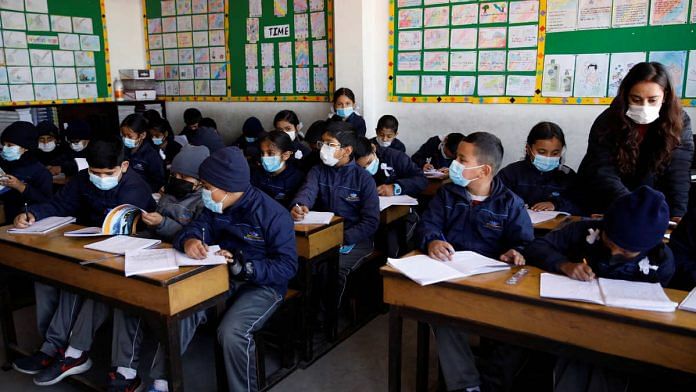New Delhi: In a study that could have implications on the decision on when to open schools, Australian researchers have reported that children may be able to mount an immune response to the SARS-CoV-2 virus without actually getting infected.
Children are believed to have less severe Covid-19 infection and are often asymptomatic, but this is the first study that showed mere exposure to the virus can trigger an immune response among them, including the presence of neutralising antibodies.
In a family from Melbourne in which both parents were positive for Covid-19, their three children — one even sharing a bed with the parents — were found to be negative after being repeatedly tested for Covid using RT-PCR.
Two of the children developed mild Covid-like symptoms, while the third — the girl who slept in the parents’ bed — stayed asymptomatic throughout and had the strongest immune response, the study said.
“Cellular immune profiles and cytokine responses of all children are similar to their parents at all timepoints,” researchers from Murdoch Children’s Research Institute (MCRI) wrote in an article, published on 11 November, in Nature Communications.
“All family members have salivary anti-SARS-CoV-2 antibodies detected, predominantly IgA, that coincide with symptom resolution in 3 of 4 symptomatic members. Plasma from both parents and one child have IgG antibody against the S1 protein and virus-neutralising activity detected…” they added.
“These data indicate that children can mount an immune response to SARS-CoV-2 without virological confirmation of infection, raising the possibility that immunity in children can prevent the establishment of SARS-CoV-2 infection. Relying on routine virological and serological testing may not identify exposed children, with implications for epidemiological and clinical studies across the life-span,” the researchers said.
They further wrote the in-depth family case study “provides novel insights into immunological responses in children exposed to SARS-CoV-2”.
“Despite close contact with infected parents, (RT) PCR testing for SARS-CoV-2 was repeatedly negative in all children, who developed minimal or no symptoms. However, the children had similar cellular and SARS-CoV-2 specific antibody-mediated immune responses to their parents, suggesting that the children were infected with SARS-CoV-2 but, unlike the adults, mounted an immune response that was highly effective in restricting virus replication,” they added.
Also read: Cases of children with Covid far fewer, but significantly threaten world’s ability to reopen
Parents contracted Covid at a wedding in March
The fact that the children tested negative for the novel coronavirus, was also corroborated by the fact that the children’s blood profiles showed no signs of inflammation, which is a common response of the body to any infection.
The parents had contracted the disease at a wedding in March that they had attended without the children, which later turned out to have been the source of a Covid-19 outbreak.
Dr Melanie Neeland from MCRI said: “The youngest child, who showed no symptoms at all, had the strongest antibody response.”
“Despite the active immune cell response in all children, levels of cytokines, molecular messengers in the blood that can trigger an inflammatory reaction, remained low. This was consistent with their mild or no symptoms.”
Covid seems to affect children less
While millions of children across the world have tested positive for Covid and also developed complications that have similarities to the Kawasaki Disease, it is in general believed that the pandemic has affected children less.
Whether it is because schools in general have stayed shut or because of the peculiarities in the immune response on children is, however, not clear.
According to the Centers for Disease Control and Prevention (CDC): “Most children with Covid-19 have mild symptoms or have no symptoms at all. However, some children can get severely ill from Covid-19. They might require hospitalisation, intensive care, or a ventilator to help them breathe. In rare cases, they might die.”
“CDC and partners are investigating a rare but serious medical condition associated with Covid-19 in children called Multisystem Inflammatory Syndrome in Children (MIS-C). We do not yet know what causes MIS-C and who is at increased risk for developing it,” the CDC said.
Also read: Children are getting Covid sitting at home, reopening schools can help them & the community




Tell us what we don’t know. For instance, Can the asymptomatic “super-immune” school/college going youngster shed viruses and infect the grandparent staying in the same house? That’s a question that needs a reply.! The existing article is a non-issue, since safety of children was never a factor to keep shut educational institutions. When it comes to a toss-up between the safety of the elderly and educating our young, are we stuck between the devil and the deep sea?